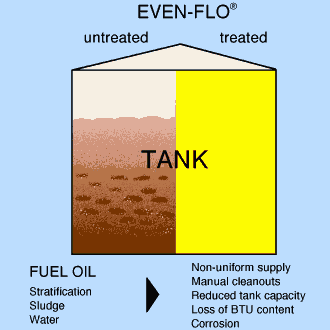
INTRODUCTION
Other petroleum products have additives
and treatments, so why not residual fuel oil? Due to a less efficient method
of handling this type of oil, type of composition, and more precision in
our modern oil burning equipment, treatment has become a necessity.
There is no question that today's heavy fuel oils, like No. 5 and 6 grades,
do have and produce more sludge, than these same types did a few years back.
This is due to types of refining processes and blending, which change the
chemical and physical composition of the oil. These changes produce an oil
subject to instability. This instability must be combatted or tolerated.
However, toleration does not help your combustion, nor clean your fuel oil
system.
Efficient operation needs clean oil, as well as a clean system. This optimum
is not reached by cleaning the storage tank when the sludge build-up has
reached the suction line. It is obtained by treating the fuel oil constantly
with a material that will prevent and retard sludge formation, disperse
solids, and eliminate the water.
SLUDGE--WHAT IS IT?
In your storage tank you have two
materials to combat; water and particles of solid chemical compounds, commonly
called sludge. Water is due mostly to condensation and leaking manholes,
and occasionally from the oil supplier. Regardless, it is always found either
on the tank bottom or stratified at different levels throughout the oil.
Modern refining cracking processes produce fuel oils that are subject to
sludge formation. The sludge particles are formed principally by blending
and mixing fuel oils of different types, either at the refinery or in the
consumer's tank. They may also be formed from reactions due to moisture,
heat and oxidation, but the amounts from these factors are small.
When the sludge particles are formed, they are quite small and if they remained
so, little trouble would occur. Unfortunately, they increase in size as
they adhere to each other, becoming so large as to block lines, strainers,
pumps and burner nozzles, if drawn into the system.
|